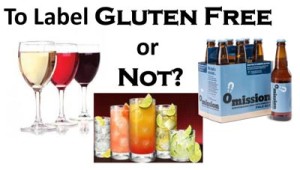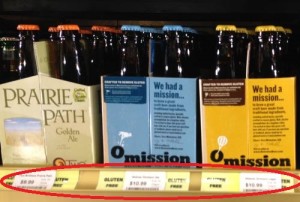Gluten Free or Not? TTB Updates Alcohol Labeling Policy
February 13, 2014 by Amy Leger | G+ Amy Leger This week, the Feds took another step forward in solidifying gluten free labeling: this time the Department of the Treasury’s Alcohol and Tobacco Tax and Trade Bureau (aka TTB), published a revised policy on gluten free labels on some of the alcohol that we purchase.
This week, the Feds took another step forward in solidifying gluten free labeling: this time the Department of the Treasury’s Alcohol and Tobacco Tax and Trade Bureau (aka TTB), published a revised policy on gluten free labels on some of the alcohol that we purchase.
The TTB said it would update its 2012 policy once the Food and Drug Administration came out with its Gluten-Free Labeling Guidelines. Those guidelines were published in August of 2013 and will go into effect on August 5, 2014. So now almost six months to the day, the TTB revealed the Revised Interim Policy on Gluten Content Statements in the Labeling and Advertising of Wine, Distilled Spirits and Malt Beverages.
The ultimate goal of the TTB policy is to ensure there is no ambiguity in labeling and advertising of these products.
Gluten Free Labeling of Wine, Distilled Spirits and Malt Beverages
Under the terms of the revised policy here are the highlights:
- If a company chooses to, “Gluten-Free” can continue to be put on labels and ads for alcoholic beverages made without any ingredients containing gluten (ie wine made from grapes or vodka distilled from potatoes)
- Companies cannot label their beverages gluten free if they are made from gluten-containing grains (like a malt beverage)
- The TTB will allow products made with a gluten-containing grain to advertise using the words “Processed” or “Treated” or “Crafted” “….to remove gluten”. But they must also use a qualifying statement like this example: “Product fermented from grains containing gluten and [processed or treated or crafted] to remove gluten. The gluten content of this product cannot be verified and this product may contain gluten.”
- The companies with gluten-containing grains will have to submit their label application to the TTB with details on how they removed the gluten and the test results of the finished products.
- “Statements, symbols, vignettes or other forms of labeling or advertising claims that expressly, or by implication characterize the relationship of a product or any substance with in the product to a disease or health-related condition (such as celiac disease) are prohibited…” according to the TTB’s revised interim policy
Reaction:
Gluten Free Dietitian Tricia Thompson of Gluten Free Watchdog told me late Wednesday “…there isn’t much that has changed [from the 2012 interim policy] except that the TTB appears to be doubling down on malt beverages…These beverages can NOT be labeled gluten-free, advertised as gluten-free, or imply quantifiable gluten content based on current methods of testing. It also appears, based on my read, that malt beverages can not include any symbols on their labels or in advertising that suggest the product is suitable for people with celiac disease (as this would be considered a health claim).”
Omission is one such beverage. Lorin Gelfand from Craft Brew, which makes Omission Beer, replied to my request for a statement about the decision.
“The Feb. 11 TTB announcement regarding gluten-free labeling does not require any changes in the way Omission Beer is labeled, or any other aspect of the production and sale of our beers. We want the many thousands of Omission Beer drinkers in the U.S. to know that we will continue business as usual. Omission Beer appreciates the strong interest of our growing and enthusiastic following and looks forward to continuing to work with the TTB to ensure that our products are labeled according to their guidelines.” -Lorin Gelfand
You may recall last November the Celiac Sprue Association gave Omission its recognition seal. The CSA’s website describes “…products bearing the CSA Recognition Seal represent critical review of the company’s manufacturing practices and procedures to reduce risk for our gluten-free customers. In addition to product testing with the strictest testing methods in the industry, the CSA Recognition Seal proves the company’s commitment to a quality gluten-free product for celiac and gluten-sensitive individuals.”
Yesterday, Larry Brauer of the CSA told Gluten-Free Fun, in part, “Neither label [Omission or CSA] will use the terms ‘gluten-free’. Craft Brew will use the statements required by the TTB regarding removal of gluten, and the CSA Recogniton Seal will continue, as in the past, to not use the terms ‘gluten-free’.”
Doesn’t being awarded this seal blur the gluten-free lines a bit? Wouldn’t point 5 (quoted above from the TTB policy) mean receiving the CSA Recognition Seal implies that celiacs can drink it? It definitely raises questions for Thompson. “It is pretty clear to me that under the TTB’s interim rule Omission should not use the CSA seal on their labels or in advertising,” Thompson says. “In my opinion, CSA jumped the gun on this one and should retract the seal for Omission.”
In my late-night stop at the liquor store Wednesday night to look first-hand at Omission’s boxes and bottles, I didn’t see the CSA seal on the labels or boxes, nor did I see the actual seal on their website. However they do have a press release on the announcement and emblems of being voted best Gluten Free Beer at the Great International Beer and Cider Competition on their website.
During my liquor store recon mission I did notice the liquor store itself seemed to have labeled Omission and another similar product next to it with bright yellow gluten free stickers sitting next to the price tag on the shelf. Doesn’t that negate all the work that is being done here? So who polices in-store advertising?
What’s Next?
Finally, we should know much more when the FDA issues a separate rule on how it will handle the labeling of hydrolyzed and fermented foods which will help define beverages like Omission and Mike’s Hard Lemonade more clearly. The TTB says it may revise its policy after seeing how the FDA acts on this matter.
Tags: alcohol, beer, celiac, CSA, FDA, gluten-free, Omission, TTB, wine




February 13th, 2014 at 8:51 am
Thanks for the excellent post, Amy. As usual, research always seems to lead to another concern (your point on shops labeling items gluten free, no matter what applicable governing agencies say). I’ve always said that there’s actually very little in the gluten-free world that is black and white. It’s almost all gray and we need much, much more than unclear and limited guidance, which takes months and years to even happen, from our governmental agencies and our gluten-free organizations that folks look to for guidance/support. Keep fighting the good fight!
Thanks,
Shirley
February 13th, 2014 at 1:54 pm
Thanks Shirley! One thing does seem to lead to another doesn’t it? Looking forward to seeing you in FLA in April!
February 13th, 2014 at 5:11 pm
Thanks for taking the time to spell this out so clearly. It does all seem a bit “muddy”. And the point you make about the in-store advertising is right on target. Restaurants can’t make similar claims, so why should retail stores be able to? Food for thought. 😛
February 20th, 2014 at 12:00 am
I’m eager to see wine makers label wines that have been aged in barrels that are sealed with wheat paste. Fortunately, all that I have contacted have been up-front about it when specifically asked. It makes just ordering a glass of wine at dinner a hassle. Yes, all wine is gluten free; but, has it been exposed to wheat paste? I feel “glutened” after many wines and was relieved when I realized what the problem was…